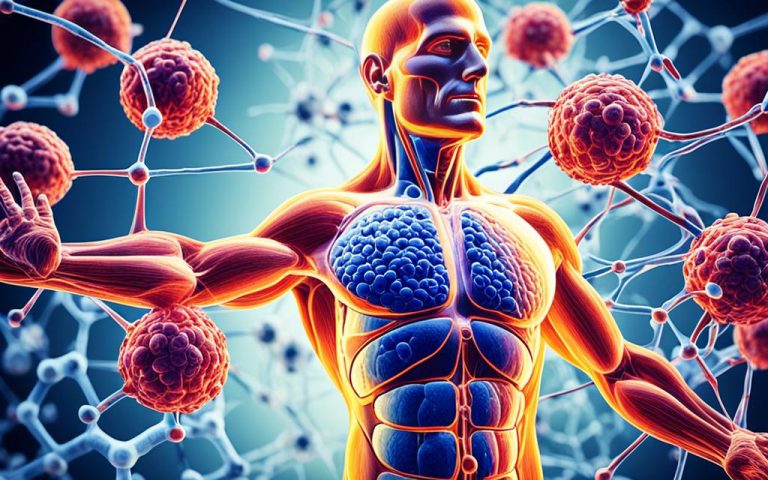Diet Therapy and Nutritional Prophylaxis Guide
Welcome to this detailed guide on diet therapy and nutritional prophylaxis. We’ll show you how personalized diet plans can help prevent diseases and boost your health. By choosing meals that fit your health goals, you’re on your way to a better, more energetic life.
Diet therapy is about changing what you eat to stay healthy or fight illness. On the other hand, nutritional prophylaxis focuses on using food to stop sickness before it starts. Doing both can really lift your health and happiness levels.
Next, we’ll teach you how to figure out what your body needs and then make a personal diet plan. These steps, combined with healthy habits, are key to keeping diseases away and enjoying a full life of optimal health.
Key Takeaways
- Understanding the importance of diet therapy and nutritional prophylaxis.
- Advantages of making a diet plan that fits your health condition.
- How changing what you eat can help avoid illnesses and feel better.
- Seeing how what you eat affects your health in the long term.
- Why it’s important to have a pro help you reach your eating goals.
Understanding Diet Therapy and Nutritional Prophylaxis
Diet therapy and nutritional prophylaxis are key in better health and stopping diseases. This section will explain these terms and what they involve. You’ll see how getting the right nutrition can help fight off health problems.
Defining Diet Therapy and Its Role in Health
Diet therapy uses food as a healing tool. It’s essential for good health because what we eat affects our body’s functions. This method offers a way to treat health issues without always needing medicine. This is done by adjusting what we eat to meet our specific health needs.
Principles of Nutritional Prophylaxis
Preventing disease with the right nutrition is what nutritional prophylaxis is about. Here are its key principles:
- Balanced intake of macronutrients and micronutrients to support bodily functions.
- Regular dietary assessments to preempt the onset of diet-related diseases.
- Integration of evidence-based dietary strategies into daily eating habits to sustain health long-term.
The Science Behind Nutrition and Disease Prevention
Many studies show how nutrition links to preventing diseases. They explain that not eating right can lead to health issues. They also show that good nutrition helps the immune system and keeps our hormones balanced.
This research is the foundation of diet therapy and nutritional prophylaxis. It highlights their key roles in keeping us healthy.
Assessing Your Nutritional Needs for Personalized Diet Planning
Figuring out your nutritional needs is a key first step in making a personalized diet plan. This plan fits your health and lifestyle. Knowing your needs helps find what nutrients you might be missing. And it helps customize a plan that makes you feel better overall.
First, look at your age, gender, and health. Also, think about how active you are and if you’re pregnant or have an illness. These parts help make your diet unique to you.
- Gather Basic Information: Record your age, weight, height, and sex first. This info is the base for figuring out how many calories you need.
- Consider Activity Levels: Your daily exercise changes how many calories and nutrients you need. Whether you’re not very active, somewhat active, or super active, each lifestyle needs its own diet plan.
- Account for Health Conditions: If you deal with health issues like diabetes or food allergies, diet planning is crucial. The right diet can help with treating and managing these conditions.
- Consultation with Healthcare Providers: It’s a good idea to talk with dietitians or nutritionists. They offer insights and diet advice that fits your health needs.
| Assessment Criteria | Importance | Resources for Evaluation |
|---|---|---|
| Body Mass Index (BMI) | Shows if you have too much body fat. Guides weight management plans. | Healthcare providers and BMI calculators online |
| Nutrient Deficiency Tests | Finds what vitamins and minerals you’re short on, for targeted boost | Healthcare-provided blood tests |
| Daily Caloric Needs | Makes sure you have enough energy and keeps your metabolism healthy | Advice from nutritionists and online calculators |
| Allergy and Intolerance Screening | Prevents bad reactions and makes diet better for your stomach | Tests run by specialists |
By clearly understanding your diet needs, you set the stage for a plan that’s just for you. This strategy doesn’t just consider what you like to eat and what you can’t. It also makes sure you get all the right nutrients. This way, you enjoy a healthier, well-balanced life.
The Interplay Between Diet Modification and Health Outcomes
Looking into how diet changes can boost our health is eye-opening. Even small diet tweaks can make a big difference. They help with both staying healthy and managing diseases.
Positive Impacts of Diet Changes
Changing what you eat can really improve your health. It helps your body work better, lowers the chance of getting sick, and even boosts your mood. Eating more fruits, vegetables, and whole grains helps a lot.
Common Misconceptions About Dieting
Many believe you need to cut a lot of calories or stop eating certain foods to get healthy. But, a balanced approach is better. It’s about making choices that fit your life and nutritional needs.
Case Studies: Successful Diet Modifications
Real stories show how changing your diet can be life-changing. These case studies feature people who bettered their health by adjusting what they eat. Their experiences point out the value of personalized diet changes.
Here is a comparative table of typical health outcomes observed before and after diet modifications based on several case studies:
| Health Parameter | Before Diet Change | After Diet Change |
|---|---|---|
| Blood Pressure | High | Normalized |
| Blood Sugar Levels | Elevated | Stabilized |
| Cholesterol Levels | High | Reduced |
| Weight | Overweight | Healthy Range |
| Mental Well-being | Poor | Improved |
Integrating Holistic Nutrition into Your Lifestyle
Lifestyle diseases are on the rise. Integrating holistic nutrition in your daily life can boost your health. It helps you live a more balanced life by focusing on overall well-being.
What is Holistic Nutrition?
Holistic nutrition is all about eating whole foods. These foods have the nutrients your body really needs. It’s more than just a diet; it’s a way of living that looks at food’s source, how it’s made, and what it does to you.
How to Embrace a Holistic Eating Approach
Start by choosing high-quality foods. Find organic and locally-sourced products. It’s important to think about the nutrients in your meals. Holistic eating means making smart choices about what you eat.
Benefits of Mindful Eating
Mindful eating can change how you relate to food. It means being present and enjoying every bite. This way of eating can help with digestion and lower stress. You’ll start to love your meals more, which is good for your overall health.
| Aspect of Holistic Eating | Benefits |
|---|---|
| Whole Foods | Richer in nutrients and free from artificial additives |
| Local and Organic Produce | Supports local economies and reduces environmental impact |
| Mindful Consumption | Improves mental health and promotes dietary satisfaction |
Designing a Personalized Diet Plan for Optimal Well-being
Starting your way to better health means eating in ways that match your body’s needs. Making your own diet plan is key to reaching your health targets. This guide will show how to create a plan that’s not just healthy, but also easy to follow daily.
Steps to Crafting Your Diet Plan
First, you need to know what your body needs and how it’s doing. A nutritionist is great to help figure this out. They can look at your health and suggest what’s best for you. Here’s what you should do:
- Assess your nutritional needs based on factors like age, gender, activity level, and health conditions.
- Set realistic and achievable dietary goals.
- Choose foods that you enjoy and that meet your nutritional requirements to ensure sustainability.
Incorporating Flexibility and Choice in Meal Planning
It’s important to be flexible and have choices in your meal plan. This keeps you excited and focused. A flexible diet can also change with your life and what you like. Here’s how to mix it up:
- Include a variety of foods from all food groups to ensure comprehensive nutrient intake and prevent boredom.
- Plan for occasions when you might eat out or order in, choosing healthier options that align with your dietary goals.
- Allow for occasional treats to keep your diet enjoyable and pragmatic without derailing your progress.
Consulting with a Nutritionist for Best Results
Taking care of your diet yourself is okay. But, a nutritionist can make a big difference. They bring expert know-how on what you should eat, backed by the latest science. They ensure your diet is on track, solving problems and making it better.
Working with a nutritionist offers several benefits:
- Customization of diet plans based on comprehensive health assessment.
- Ongoing support and motivation throughout your dietary adjustment.
- Professional assessment of your progress and adjustments to your diet plan as needed.
Creating a diet plan the right way—with or without a nutritionist—can really help you on the road to better health. A plan that has room for change, is your choice, and gets expert advice can change your life. It’s all about finding the right balance and sticking with it.
Essential Components of Nutritional Counseling
When we talk about nutritional counseling, it’s key to know its essential parts. This knowledge is crucial for those wanting to improve their eating habits and meet nutritional targets. It’s more than suggesting what to eat. It’s a deep process aimed at individual needs, offering support and knowledge. They help people understand how to make smart diet choices.
The process starts with a full check-up. Dietitians and nutritionists look at what you eat and check your health needs. With this info, they can give advice and steps that are just for you. Let’s now focus on the main components of good nutritional counseling.

- Assessment of Nutritional Needs: Every good diet plan begins with understanding what your body needs. They look at things like your age, health, what you do, and what foods you like.
- Goal Setting: Having clear goals is a must. They must be specific, easy to measure, something you can really do, important to you, and have a deadline.
- Personalized Planning: Plans are adjusted to fit each person. This makes the advice meaningful and easy to follow.
- Continuous Monitoring and Support: Keeping in touch is important. They check how you’re doing and change things as needed to keep the diet on track.
- Educational Resources and Tools: They give you materials to learn about food’s value. This helps you to choose better on your own.
A personalized approach in nutritional counseling is all about educating and advising each person. Imagine detailed areas where this advice is crucial:
| Component | Description | Impact on Client |
|---|---|---|
| Customized Dietary Strategies | Designed for specific health and lifestyle needs. | Makes it easier to stick to dietary advice and improves health. |
| Accountability and Support | Regular meetings and adapting your diet when needed. | Keeps you on track and ensures your diet fits your changing needs. |
| Educational Empowerment | Teaching you about nutrients and food choices. | Helps you make good decisions long after the counseling ends, for lasting good health. |
To truly understand nutritional counseling, we must know its essential parts. This client-focused method helps with immediate dietary concerns and builds a strong relationship with healthy eating habits for the long run.
Role of Dietary Supplements in Complementing Your Diet
Dietary supplements can be key in making sure your diet is complete. They help cover any nutritional gaps, especially when you’re lacking in certain nutrients. Using these supplements the right way can bring you benefits without many risks.
Identifying When Supplements Are Necessary
When your diet can’t supply all necessary nutrients, supplements step in. This happens because of various reasons like your life stage, health issues, or specific diets. For example, pregnant people and those with food restrictions may need supplements for good health.
Choosing High-Quality Supplements
- Research reputable supplement brands, for example with USP or NSF certification.
- Ensure brands are clear about where they get their ingredients and how they make their products.
- Turn to healthcare experts to find the right supplements for you.
Understanding the Risks and Benefits
Supplements can greatly help but need to be approached with caution. Taking too many or the wrong kind can be harmful. This is why it’s smart to work with healthcare providers when using them. Good supplements can boost health, help prevent illnesses, and up well-being.
Implementing Healthy Eating Tips for Everyday Life
Adding healthy eating tips to your day is not hard. Wanting quick meal ideas or to keep things balanced, it’s simple to do. There are easy ways to handle and beat diet challenges.
Quick and Nutritious Meal Ideas
When you need to eat fast and keep it healthy, knowing quick meals is great:
- Overnight oats topped with fruits and nuts are ideal for busy mornings.
- Wrap sandwiches with chicken, veggies, and a bit of feta make a great lunch.
- Stir-fry with veggies, tofu or shrimp, and rice is ready in under 20 minutes.
Strategies to Overcome Common Dietary Challenges
Getting to a healthier diet might not be easy. Here are ways to deal with common hurdles:
- Prep meals early to avoid fast food when you’re busy.
- Keep healthy snacks in your pantry to fight off bad food cravings.
- Choose water over sugary drinks to cut down on sugar.
Maintaining Balance and Moderation
Staying balanced and moderated is crucial for health. It’s not just what you eat, but how much:
| Food Group | Recommended Serving Size | Typical Mistakes |
|---|---|---|
| Fruits | 1 medium piece or 1/2 cup chopped | Sticking to one kind of fruit instead of a variety |
| Vegetables | 1 cup raw or 1/2 cup cooked | Focusing too much on starchy vegetables |
| Proteins | 3-4 oz or the size of a deck of cards | Consuming too much red meat |
| Grains | 1 slice of bread or 1/2 cup cooked rice, pasta, or cereal | Not picking whole grain options |
By using these healthy eating tips, trying quick meal ideas, and finding balance and moderation, you can change your diet. It’s not overwhelming, making your health journey possible and fun.
Advanced Nutrition Therapy Techniques and Tools
Nutritional science is ever-evolving. This means professionals use advanced nutrition therapy techniques and tools that are new. These help improve the health of their patients. By using these new methods, experts can make sure the help they offer matches the specific diet needs of everyone.
New nutrition therapy includes using savvy tools. These tools help check, watch, and control what people eat in their plans. For example, there’s software that keeps track of what someone eats and checks if their diet is good for them. All these tools help dietitians and nutrition specialists do their work more clearly and accurately.
Modern nutrition approaches have changed the game. Now, experts can do genetic tests on people to see how they specifically react to certain foods. They also look at the gut’s bacteria to design diets that help the digestive system and overall health.
Now, let’s look at some advanced tools often used in nutrition therapy:
| Technology | Function | Benefits |
|---|---|---|
| Digital Food Scales | Precise measurement of food portions | Enables accurate tracking of caloric and nutritional intake |
| Nutrition Analysis Software | Analyzes dietary intake for nutritional content | Provides detailed insights into macronutrient and micronutrient levels |
| Genetic Testing Kits | Assesses genetic predisposition to metabolic conditions | Helps in personalizing diet plans based on genetic makeup |
| Wearable Fitness Trackers | Monitors physical activity and caloric expenditure | Integrates physical activity data with nutrition plans for holistic management |
By adopting these advanced nutrition therapy techniques and tools, you can improve your diet and health choices. Stay tuned for more new and personalized solutions in the field of nutrition. Science and tech are always bringing new and better ways to help us pick the right foods.
The Importance of Consistent Meal Planning for Long-term Health
Meal planning is about more than just sorting your weekly meals. It’s a smart way to keep your health on track long term. By planning your meals carefully, you make sure you’re eating in a way that supports your health and happiness.
Setting Up a Meal Schedule that Works for You
Finding a meal plan that fits your life is the first step. Look at your day and decide when to eat to avoid hunger. A good routine can help you eat right and stop snacking on junk food.
Tips for Efficient Grocery Shopping and Preparation
Smart shopping and prep make your meal plan work. Make a list that matches the store’s layout and stick to it. Get ahead by prepping ingredients like cutting veggies or marinating meat. This saves time and stress when you cook.
How to Adjust Your Plan as Your Needs Change
Being able to change your meal plan is important because life can be unpredictable. You might need to alter your plan to fit a new schedule or health goals. Always review and adjust your plan so it keeps benefiting your health.
| Strategy | Benefits | Tips for Implementation |
|---|---|---|
| Bulk Preparation | Saves time and ensures adherence to the meal schedule | Choose one day to prepare most meals for the week |
| Flexible Meal Choices | Accommodates changing dietary needs and preferences | Keep a variety of basic ingredients to allow for last-minute meal adjustments |
| Seasonal Shopping | Maintains freshness and maximizes nutritional value | Adjust your shopping list to include seasonal produce that can be incorporated into various meals |
Diet therapy and nutritional prophylaxis
In the world of health and nutrition, diet therapy and nutritional prophylaxis are key. They lead us into the future of personalized nutrition. With innovations and cutting-edge research, our view on preventing diseases is changing. This change aims to improve our overall health.
The Future of Personalized Nutrition and Disease Prevention
Personalized nutrition is now doable thanks to tech progress. It moves beyond general advice to exact plans that stop diseases early. Looking at a person’s genes, habits, and surroundings helps create these plans. This is a big step in nutritional prophylaxis.
Innovations in Diet Therapy
Recent innovations have shifted our understanding of health diets. They include special food parts for health issues and AI used in meal plans. This mix of science and health boosts diet therapy’s benefits. It also makes healthy eating more enjoyable and lasting.
Cutting-Edge Research in Nutritional Prophylaxis
Top researchers are making big discoveries in nutritional prophylaxis. They’re looking at how our gut health impacts our immunity, metabolism, and disease risks. This work helps us see how our diets directly affect our health. It’s setting the foundation for new and effective health care tactics.
| Focus Area | Innovation | Potential Impact |
|---|---|---|
| Bioactive Compounds | Development of food items rich in specific nutrients | Targeted prevention and management of diseases |
| Digital Tools | AI in meal planning and health tracking | Enhanced personalization and adherence to dietary plans |
| Microbiome Research | Analysis of gut flora and its dietary influences | Improved immune function and reduced disease risk |
This mix of tech, studies, and practical uses highlights the strength of diet therapy and nutritional prophylaxis. It signals a new chapter in personal health management and preventions designed for each person.
Conclusion
The importance of diet therapy and nutritional prophylaxis cannot be overstated. It plays a key role in keeping us healthy and preventing illness. A personalized diet plan is crucial for your well-being. It meets your health needs and fits your life.
By focusing on the right nutrients and eating habits, you can steer your health in the right direction. You learn how to choose what’s best for your body. This helps in improving your health over time.
Starting with these strategies benefits your body and life quality. Improving your well-being is an ongoing process. Staying on top of your diet is essential. It can help you avoid health problems or just feel better in general.
So, use what you’ve learned here to take charge of your health. Work with a nutrition expert to craft a plan that’s just for you. This plan should meet your health goals and needs. Choosing the right food is the first step towards a healthier you.
FAQ
What is diet therapy and nutritional prophylaxis?
Diet therapy uses a special diet to deal with health issues directly. Nutritional prophylaxis is about making food choices to stop diseases. Both aim to boost your well-being.
What is the role of diet therapy in maintaining good health?
Diet therapy keeps you healthy by giving your body the right nutrients. It helps with health problems, gives you energy, helps with weight, and makes you feel great.
What are the principles of nutritional prophylaxis?
The key points are choosing foods that are full of nutrients, eating the right amount, and avoiding junk food. Staying hydrated, being active, and handling stress are also vital.
Is there scientific evidence that nutrition plays a role in preventing diseases?
Yes, studies confirm that the right food lowers disease risks. Eating balanced meals cuts the chances of heart issues, diabetes, obesity, and some cancers.
How can I assess my nutritional needs for personalized diet planning?
Think about your age, activity, and any health issues. Your food preferences matter too. A dietitian can help create a plan just for you.
What are the positive impacts of diet modification?
Changing what you eat can do a lot of good. It can control your weight, lower sugar and cholesterol, and boost your health overall.
What are some common misconceptions about dieting?
Not all fats are bad. Skipping meals isn’t a good way to lose weight. Carbs are okay in moderation. A balanced diet is better than a strict one.
Can you provide some case studies of successful diet modifications?
Sure! We have many success stories. People have improved their health by changing what they eat. Such changes have helped with diabetes, heart problems, and obesity.
What is holistic nutrition?
Holistic nutrition views health as connected to mind, body, and spirit. It’s about eating whole foods and managing stress for complete health.
How can I embrace a holistic eating approach?
To eat holistically, focus on whole foods and avoid artificial stuff. Mindful eating, hydration, stress management, and staying active are key.
What are the benefits of mindful eating?
Mindful eating means paying full attention to meals. It helps with digestion, meal enjoyment, prevents overeating, and creates a good food outlook.
How do I design a personalized diet plan for optimal well-being?
Create a diet that fits your needs and goals. Include nutrients you require, control portions, and make it work with your life. A dietitian can help.
How can I incorporate flexibility and choice in meal planning?
Keep your meals varied and try new foods. Allow treats now and then. Be ready to change your meals based on your schedule and tastes.
Why is consulting with a nutritionist important for diet planning?
Nutritionists guide you based on your health and diet. They offer advice, help you avoid allergies or restrictions, check on your progress, and support you.
What are the essential components of nutritional counseling?
This counseling checks your goals, habits, and health history. It teaches you good nutrition, helps you plan meals, controls portions, and supports making good choices.
How do I identify when dietary supplements are necessary?
Supplements might be needed if you lack certain nutrients. A dietitian or doctor can check this. They’ll tell you if supplements will help your diet.
How do I choose high-quality dietary supplements?
Pick supplements from trustworthy companies that are tested for safety. Look for NSF or USP labels. Talking to a professional ensures they’re right for you.
Are there any risks associated with dietary supplement use?
Supplements can be risky if not used right. They might not go well with meds, cause imbalances, or have wrong health claims. Always consult your doctor first.
What are some healthy eating tips for everyday life?
Eat lots of fruits, veggies, and whole grains. Choose lean proteins, drink water, and cook at home. Snack healthy and watch your portions. Plan your meals in advance.
Can you provide some quick and nutritious meal ideas?
Here are quick and healthy meals: a salad with grilled chicken and veggies, pasta with veggies and shrimp/tofu, stir-fried rice, yogurt with nuts and fruit, and salmon with veggies and quinoa.
How can I overcome common dietary challenges?
To win against diet problems, plan, keep healthy snacks handy, and eat mindfully. Find tasty, but healthy, substitutes. Support from loved ones is important. Focus on getting better, not perfect.
Why is maintaining balance and moderation important in eating habits?
Balanced and moderate eating keeps you well. It lets you enjoy food and get all the nutrients. It stops you from eating too much or too little, and avoids bad eating habits.
What are advanced nutrition therapy techniques and tools?
Advanced nutrition uses tech for personalized health. This includes checking your genes, wearing devices, and apps that learn from your info to suggest food.
Why is consistent meal planning important for long-term health?
Planning what you eat helps you stay healthy. It makes your diet full of nutrients, controls your weight, and cuts junk food. It also saves time and brings order to your day.
How do I set up a meal schedule that works for me?
Consider your daily life and what you like. Eat at set times. Have three meals a day with snacks if needed. This keeps you energized and healthy.
What are some tips for efficient grocery shopping and meal preparation?
Make a list and plan your meals. Buy in bulk for savings. Use foods that can be in many dishes. Set a time to prep food weekly. This makes cooking easier.
How can I adjust my diet plan as my needs change?
Regularly check your diet to fit your current life and health. As you change, so does what you need to eat. A dietitian can help you keep on the right path.
What is the future of personalized nutrition and disease prevention?
The future offers more ways to eat right for disease defense. Personal nutrition will get more precise. Tech will help you track health better and suggest custom diets.
What are some innovations in diet therapy?
Diet therapy is getting better with apps, gene studies, and AI to pick food just for you. These changes promise a more effective diet therapy for health.
What cutting-edge research is being done in nutritional prophylaxis?
Top research looks at how your gut and certain nutrients affect health. It’s also testing how tailor-made nutrition influences diseases. Functional foods are studied for health benefits.







